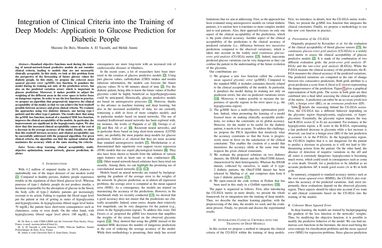Integration of Clinical Criteria into the Training of Deep Models: Application to Glucose Prediction for Diabetic People

Standard objective functions used during the training of neural-network-based predictive models do not consider clinical criteria, leading to models that are not necessarily clinically acceptable. In this study, we look at this problem from the perspective of the forecasting of future glucose values for diabetic people...
In this study, we propose the coherent mean squared glycemic error (gcMSE) loss function. It penalizes the model during its training not only of the prediction errors, but also on the predicted variation errors which is important in glucose prediction. Moreover, it makes possible to adjust the weighting of the different areas in the error space to better focus on dangerous regions. In order to use the loss function in practice, we propose an algorithm that progressively improves the clinical acceptability of the model, so that we can achieve the best tradeoff possible between accuracy and given clinical criteria. We evaluate the approaches using two diabetes datasets, one having type-1 patients and the other type-2 patients. The results show that using the gcMSE loss function, instead of a standard MSE loss function, improves the clinical acceptability of the models. In particular, the improvements are significant in the hypoglycemia region. We also show that this increased clinical acceptability comes at the cost of a decrease in the average accuracy of the model. Finally, we show that this tradeoff between accuracy and clinical acceptability can be successfully addressed with the proposed algorithm. For given clinical criteria, the algorithm can find the optimal solution that maximizes the accuracy while at the same meeting the criteria.